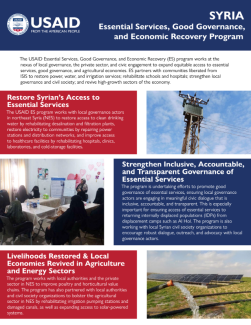The USAID Essential Services, Good Governance, and Economic Recovery (ES) program works at the nexus of local governance, the private sector, and civic engagement to expand equitable access to essential services, good governance, and agricultural economies. ES partners with communities liberated from ISIS to restore power, water, and irrigation services; rehabilitate schools and hospitals; strengthen local governance and civil society; and revive high-growth sectors of the economy.
Goals
Restore Syrian's Access to Essential Services
The USAID ES program works with local governance actors in northeast Syria (NES) to restore access to clean drinking water by rehabilitating desalination and filtration plants, restore electricity to communities by repairing power stations and distribution networks, and improve access to healthcare facilities by rehabilitating hospitals, clinics, laboratories, and cold-storage facilities.
Strengthen Inclusive, Accountable, and Transparent Governance of Essential Services
The program is undertaking efforts to promote good governance of essential services, ensuring local governance actors are engaging in meaningful civic dialogue that is inclusive, accountable, and transparent. This is especially important for ensuring access of essential services to returning internally displaced populations (IDPs) from displacement camps such as Al Hol. The program is also working with local Syrian civil society organizations to encourage robust dialogue, outreach, and advocacy with local governance actors.
Livelihoods Restored & Local Economies Revived in Agriculture and Energy Sectors
The program works with local authorities and the private sector in NES to improve poultry and horticultural value chains. The program has also partnered with local authorities and civil society organizations to bolster the agricultural sector in NES by rehabilitating irrigation pumping stations and damaged canals, as well as expanding access to solar-powered systems.
Key Results
Electricity
Restored electricity for more than 313,000 residents in NES by installing new transformers and rehabilitating electrical transmission lines in Hasakah City, Raqqa City, and Izbeh and Moazilieh towns in Deir ez-Zour, as well as rehabilitating the Darbasiyah Power Station in Hasakah.
Health
Rehabilitated three hospitals – Abu Hamam Hospital in Deir ez-Zour, Hasakah National Hospital in Hasakah City, and a Comprehensive Clinics Center in Raqqa City. The rehabilitation work in these facilities has benefited 72,000 patients per month on average.
Established four oxygen bottling facilities that can produce up to 400 medical-grade oxygen cylinders per day to treat acute respiratory illnesses, including COVID-19. The USAID ES program also established four solar-powered cold storage rooms in Deir ez-Zour and Hasakah provinces to safely store COVID-19 vaccines and other medications and rehabilitated eight health clinics in Hasakah.
Established a Health Training Center in Raqqa City and supported health systems strengthening and vaccine awareness during critical COVID-19 response periods.
Water
Rehabilitated the Shaddadi Desalination Plant and Himmah Filtration Station, providing access to clean water to over 750,000 residents in Hasakah province.
Irrigation
Rehabilitated four agricultural complexes/irrigation pumping stations, along with their associated irrigation canals, in eastern Deir ez-Zour, restored electricity to seven other agricultural facilities in Deir ez-Zour, and distributed solar-powered irrigation systems to farmers in Raqqa. These activities benefitted nearly 103,000 individuals and enhanced irrigation services for over 13,700 hectares of agricultural land.
Poultry Value Chains
Strengthened poultry production in Deir ez-Zour and Hasakah by refurbishing 27 poultry farms, establishing three egg production farms, and establishing two egg incubation/chick hatcheries. Together the hatcheries provide nearly 3 million locally hatched chicks per year making farming inputs and chicken meat more affordable and accessible for Syrian farmers and consumers, respectively. The program’s economic recovery activities, including value chain and irrigation interventions, have created over 730 new jobs in NES.
Governance
Established a Case Management System (CMS), identified the needs of Syrian returnees from Al Hol resettling in Raqqa and Deir ez-Zour provinces, and made over 1,800 service referrals for various support, including livelihoods, shelter, electricity, and food security.


